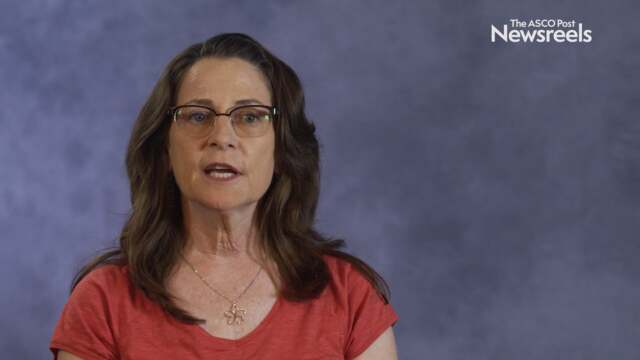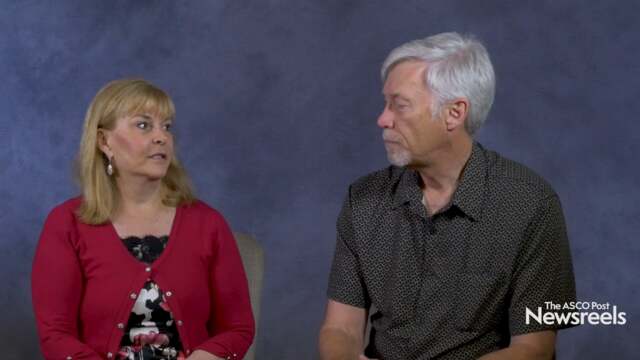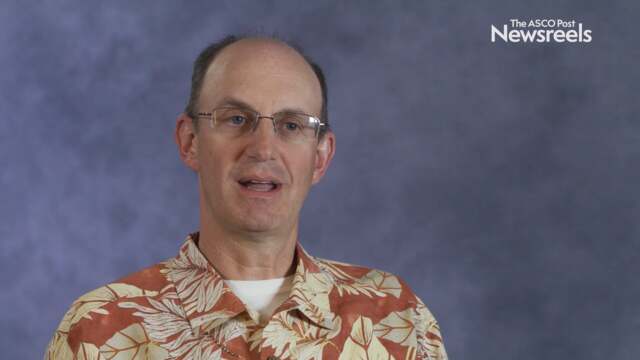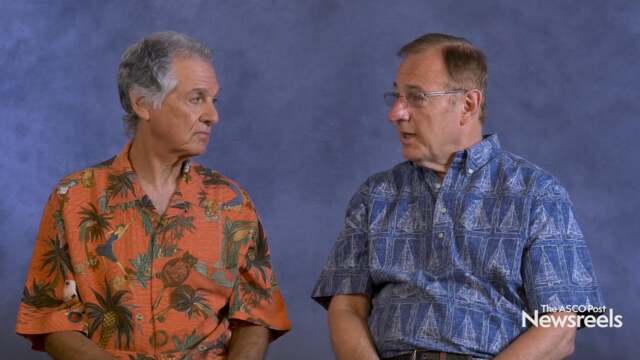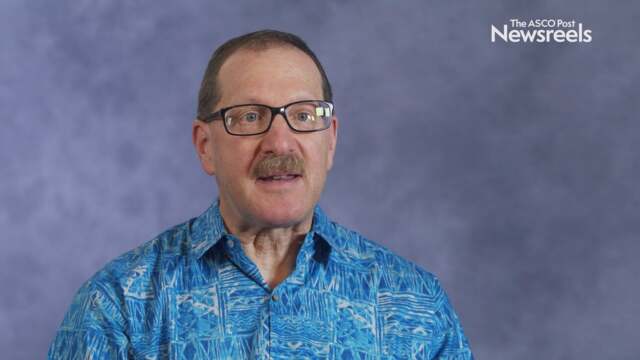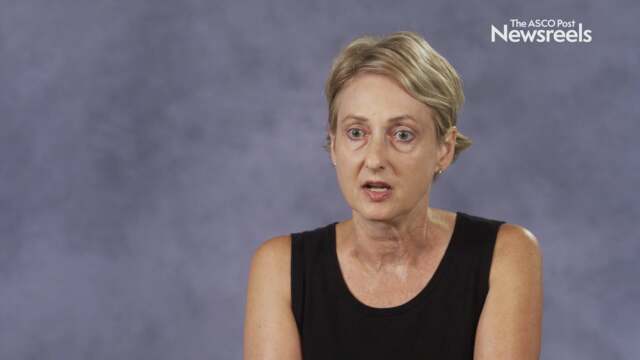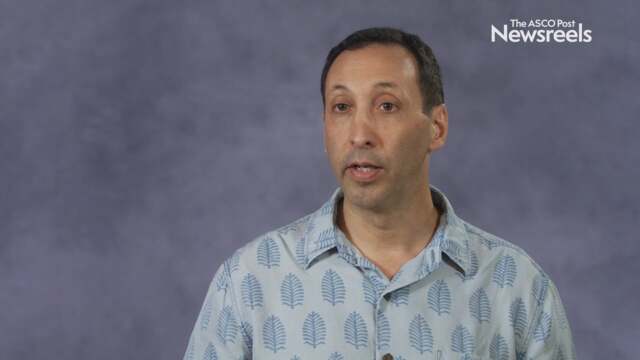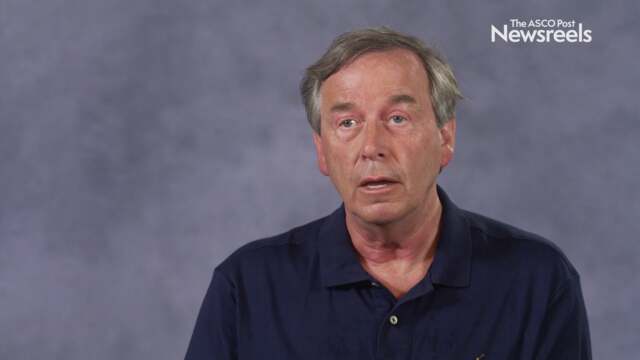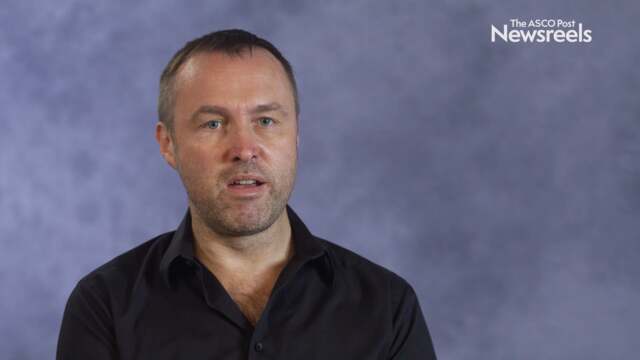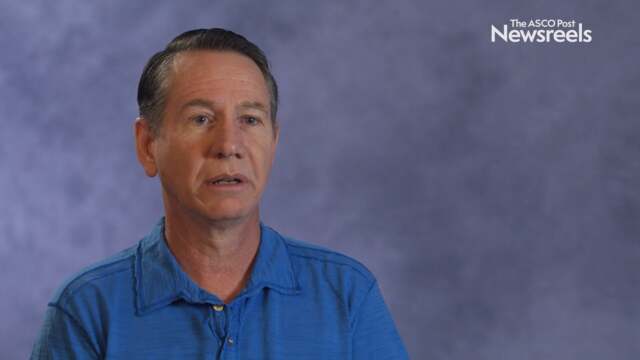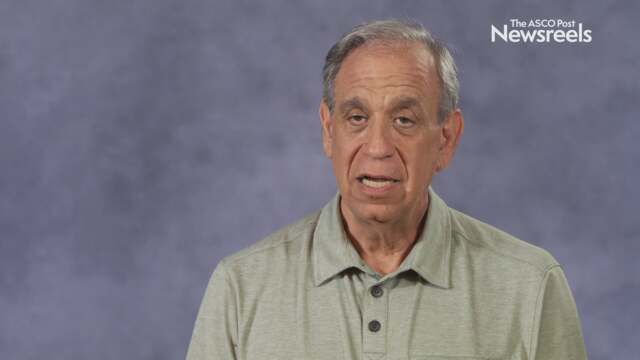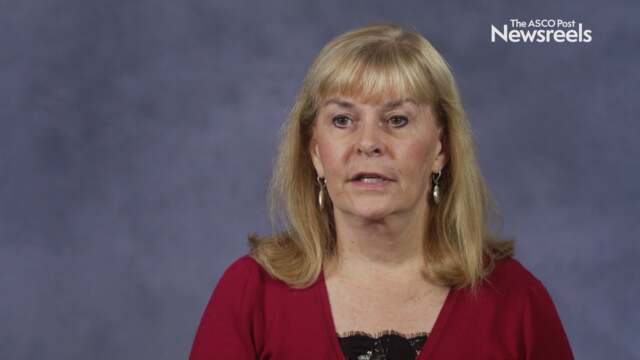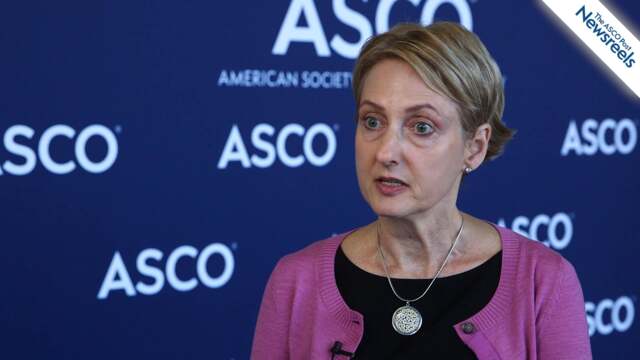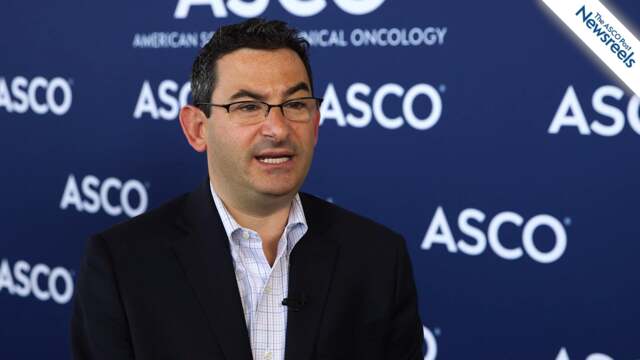CAR T-Cell Therapy in Lymphoma: Challenges Come With Success
THE EMERGENCE of chimeric antigen receptor (CAR) T-cell therapy has sparked a wave of optimism in hematologic malignancies, but as experience in using CAR T-cell therapy has grown, new challenges have surfaced. A pioneer in the field, David G. Maloney, MD, PhD, enlightened attendees on these issues ...
Childbearing Potential in Women With Hodgkin Lymphoma
In a Swedish study reported in the Journal of Clinical Oncology, Weibull et al found that childbearing potential in young women treated for Hodgkin lymphoma in more recent years is similar to that in the general population. Study Details The study included 449 women aged 18 to 40 years identified ...
Peggy Burhenn, MS, RN-BC, AOCNS, on Lymphoma: Managing Older Adults
Peggy Burhenn, MS, RN-BC, AOCNS, of the City of Hope National Medical Center, discusses the challenges of working with older lymphoma patients and the importance of effective geriatric assessments.
Julie M. Vose, MD, MBA, and David G. Maloney, MD, PhD, on NHL: Update on CAR T-Cell Therapies
Julie M. Vose, MD, MBA, of the University of Nebraska Medical Center, and David G. Maloney, MD, PhD, of Fred Hutchinson Cancer Research Center and winner of this year’s Oliver Press Memorial Award, discuss three CAR T-cell products for lymphoma treatment, comparing their efficacy, toxicity, ease of use, and the clinical resources needed.
Jonathan W. Friedberg, MD, on Follicular Lymphoma: Novel Combination Therapies
Jonathan W. Friedberg, MD, of the University of Rochester Medical Center, discusses treatments that enhance progression-free and overall survival and clear minimal residual disease—obinutuzumab plus chemotherapy, lenalidomide, and rituximab—and the types of lymphoma patients who may benefit.
Bruce D. Cheson, MD, and Richard I. Fisher, MD, on Lymphoma: Treatment Considerations
Bruce D. Cheson, MD, of Georgetown University Hospital, and Richard I. Fisher, MD, of Fox Chase Cancer Center, discuss ways to incorporate PET and CT scanning into standard of care for and research studies on lymphoma.
Philip J. Bierman, MD, on DLBCL: Managing Patients at Risk of CNS Involvement and Systemic Disease
Philip J. Bierman, MD, of the University of Nebraska Medical Center, discusses how to identify and treat the 1% to 2% of patients with diffuse large B-cell lymphoma who have central nervous system involvement as well as systemic sites at the time of diagnosis.
Laurie H. Sehn, MD, MPH, on HGBCL With Comorbidities: Upfront Therapies
Laurie H. Sehn, MD, MPH, of the British Columbia Cancer Centre for Lymphoid Cancer, discusses the challenges of treating high-grade B-cell lymphoma in older patients and those with comorbidities. Several strategies have been devised, but more research is needed as well as more options for novel therapies.
Steven M. Horwitz, MD, on CD 30+ PTCL Subtypes: Treatment Update
Steven M. Horwitz, MD, of Memorial Sloan Kettering Cancer Center, discusses aggressive subtypes of peripheral T-cell lymphoma and the coming data that may help clarify what could be the most effective treatments.
John G. Gribben, MD, DSc, on The Tumor Microenvironment, Prognosis, and Outcome
John G. Gribben, MD, DSc, of the Barts Cancer Institute, discusses how understanding the role of the tumor microenvironment can help identify treatment targets, including combination therapies, and improve outcome for patients with indolent lymphomas.
Kieron M. Dunleavy, MD, on B-Cell Malignancies: Novel-Novel Drug Combinations
Kieron M. Dunleavy, MD, of George Washington University, discusses the need for drug combinations to improve lymphoma therapy, despite unexpected toxicities, as our understanding of the molecular biology grows.
Stephen M. Ansell, MD, PhD, on Hodgkin Lymphoma: Beyond Checkpoint Inhibitors
Stephen M. Ansell, MD, PhD, of the Mayo Clinic, discusses the efficacy of PD-1 blockade in Hodgkin lymphoma, new findings related to PD-1 therapy, current combination approaches, and future treatments.
Andrew D. Zelenetz, MD, PhD, on NHL: Clinical Applications of Genomic Studies
Andrew D. Zelenetz, MD, PhD, of Memorial Sloan Kettering Cancer Center, discusses the various ways genomics can be used in diagnosing and treating non-Hodgkin lymphoma and the need for a proper support tool to help interpret the data.
Julie M. Vose, MD, MBA, on Lymphoma: Novel Pathways for Targeted Agents
Julie M. Vose, MD, MBA, of the University of Nebraska Medical Center, discusses promising pathways for inhibitors—BTK, PI3K, EZH2, bcl-2—and the clinical trials for single agents and combinations that suggest their potential for lymphoma treatment.
Progression-Free Survival as Surrogate for Overall Survival in First-Line Treatment of DLBCL
In an individual patient-level analysis reported in the Journal of Clinical Oncology, Shi et al found that progression-free survival could serve as a surrogate endpoint for overall survival in the first-line treatment of diffuse large B-cell lymphoma (DLBCL). The study involved data from 7,507...
Addition of Systemic Therapy to Involved-Field Radiotherapy in Early-Stage Follicular Lymphoma
Results of the phase III Trans-Tasman Radiation Oncology Group 99.03 trial reported in the Journal of Clinical Oncology by MacManus et al indicate that use of systemic therapy following involved-field radiotherapy (IFRT) increased progression-free survival in patients with stage I or II low-grade...
FDA Grants Orphan Drug Designation to CPI-613 for Treatment of Burkitt Lymphoma
The U.S. Food and Drug Administration (FDA) has granted Orphan Drug designation to CPI-613 for the treatment of Burkitt lymphoma. Burkitt lymphoma is a highly aggressive hematologic B-cell malignancy classically characterized by the overexpression of c-Myc. Due to the rapid proliferation rate of...
Expert Point of View: Bruce D. Cheson, MD
BRUCE D. CHESON, MD, Director of the Division of Hematology/Oncology at the Lombardi Comprehensive Cancer Center, Washington, DC, agreed that rituximab (Rituxan) plus lenalidomide (Revlimid; R2) is a reasonable first-line option, considering the findings of the RELEVANCE trial. “Dr. Fowler showed ...
Chemotherapy-Free Regimen Comparable to Rituximab-Chemotherapy as Front-Line Therapy for Follicular Lymphoma
IN PATIENTS with previously untreated advanced follicular lymphoma, the chemotherapy-free combination of rituximab (Rituxan) plus lenalidomide (Revlimid), the so-called R-squared (R2) regimen, yielded outcomes as good as those in patients who received standard rituximab-chemotherapy, in the interim ...
JAK Inhibitor Treatment for Myelofibrosis May Be Associated With Development of Aggressive Lymphomas
Austrian researchers have discovered that a small number of patients taking targeted drugs known as Janus kinase (JAK) inhibitors to treat myelofibrosis may develop aggressive lymphomas. They also speculate that screening for a preexisting B-cell clone before starting therapy may help prevent this...
Outcomes by Chemotherapy Backbone for Obinutuzumab vs Rituximab in Previously Untreated Follicular Lymphoma
In an analysis of the GALLIUM trial reported in the Journal of Clinical Oncology, Hiddemann and colleagues found that obinutuzumab (Gazyva) appeared to provide consistent progression-free survival benefit vs rituximab (Rituxan) in previously untreated follicular lymphoma, irrespective of which...
Pembrolizumab Receives FDA Approval for Relapsed or Refractory Primary Mediastinal Large B-Cell Lymphoma, Advanced Cervical Cancer
THE U.S. FOOD and Drug Administration (FDA) granted accelerated approval to pembrolizumab (Keytruda) for the treatment of adult and pediatric patients with refractory primary mediastinal large B-cell lymphoma or who have relapsed after two or more prior lines of therapy on June 13, 2018. The newest ...
I’m Proud to Have Contributed to the FDA Approval of CAR T-Cell Therapy
When I was diagnosed with diffuse large B-cell lymphoma (DLBCL) in 2013, I used to joke that if I had to get cancer, this wasn’t a bad one to have. At just 32, I was otherwise healthy, and my prognosis for a cure was good, according to my oncologist. So I felt confident that once I underwent...
Ibrutinib in Relapsed or Refractory Follicular Lymphoma
In the phase II DAWN study reported in the Journal of Clinical Oncology, Gopal et al found that ibrutinib (Imbruvica) produced a response in a minority of patients with relapsed or refractory follicular lymphoma. Study Details In the study, 110 patients with ≥ 2 prior lines of treatment...
Outcomes in Waldenström’s Macroglobulinemia Improved With Ibrutinib Plus Rituximab
In patients with Waldenström’s macroglobulinemia, the risk of disease progression was reduced by 80% with the combination of ibrutinib (Imbruvica) and rituximab (Rituxan) over rituximab alone, in the international phase III iNNOVATE trial, reported at the 2018 ASCO Annual Meeting1 and...
EHA 2018: Tazemetostat in Relapsed or Refractory Follicular Lymphoma
Positive interim data were recently presented from an ongoing phase II study of tazemetostat—a potent, selective, orally available EZH2 inhibitor—as a monotherapy for patients with relapsed or refractory follicular lymphoma. The data, presented by Salles et al at the 23rd Annual...
EHA 2018: Tisagenlecleucel Demonstrates More Than 1-Year Durability of Response in Adults With Relapsed or Refractory DLBCL
Fourteen-month results from the JULIET clinical trial showed ongoing durable responses are achievable with tisagenlecleucel (Kymriah) when administered to adult patients with relapsed or refractory diffuse large B-cell lymphoma (DLBCL). This updated analysis was presented by Borchmann et al at ...
FDA Expands Approval of Pembrolizumab to Include New Lymphoma Indication
Today, the U.S. Food and Drug Administration (FDA) granted accelerated approval to pembrolizumab (Keytruda) for the treatment of adult and pediatric patients with refractory primary mediastinal large B-cell lymphoma or those who have relapsed after two or more prior lines of therapy. KEYNOTE-170...
iLLUMINATE Trial of Ibrutinib Plus Obinutuzumab for First-Line Therapy of CLL/SLL Meets Primary Endpoint
The phase III iLLUMINATE (PCYC-1130) trial recently met its primary endpoint of improvement in progression-free survival. The study evaluated ibrutinib (Imbruvica) in combination with obinutuzumab (Gazyva) in patients with previously untreated chronic lymphocytic leukemia or small lymphocytic...
Rapid Progression of Adult T-Cell Leukemia/Lymphoma During PD-1 Inhibitor Therapy
In a letter to the editor in The New England Journal of Medicine, Ratner et al describe rapid progression of adult T-cell leukemia/lymphoma (ATLL) in three consecutive patients receiving programmed cell death protein 1 (PD-1) inhibitor therapy with nivolumab (Opdivo). As stated by the authors,...
Adherence to Oral Anticancer Treatment: Priorities in Lymphoma and CLL
ADVANCES IN cancer treatment have been nothing short of breathtaking in recent years. Among the most important has been the advent of effective oral therapies, marking a significant change in the way many patients receive treatment and in the oversight required by the cancer care team. As with...
FDA Approves Second-Line Venetoclax for CLL or SLL With or Without 17p Deletion
On June 8, the U.S. Food and Drug Administration (FDA) granted regular approval to venetoclax (Venclexta) for patients with chronic lymphocytic leukemia (CLL) or small lymphocytic lymphoma (SLL), with or without 17p deletion, who have received at least one prior therapy. MURANO Approval was based ...
2018 ASCO: Lenalidomide Plus Rituximab vs Rituximab Plus Chemotherapy in Previously Untreated Follicular Lymphoma
Results from RELEVANCE, a phase III, randomized, open-label, international clinical study conducted in partnership with the Lymphoma Academic Research Organisation (LYSARC), were presented by Fowler et al at the 2018 ASCO Annual Meeting (Abstract 7005). This study evaluated the investigational...
Hematopoietic Cell Transplantation for Follicular Lymphoma
Many patients with follicular lymphoma relapse within 2 years of initial therapy, and for a number of these individuals, hematopoietic cell transplantation is a good treatment option. Transplant, however, both autologous and allogeneic, is vastly underutilized in these patients, according to Mehdi ...
Laurie Helen Sehn, MD, MPH, on FL and DLBCL: Results From a Treatment Trial
Laurie Helen Sehn, MD, MPH, of the British Columbia Cancer Centre for Lymphoid Cancer, discusses phase II study findings on polatuzumab vedotin with bendamustine and rituximab in relapsed or refractory follicular lymphoma and diffuse large B-cell lymphoma (Abstract 7507).
Jeremy S. Abramson, MD, on Non-Hodgkin Lymphoma: Results From the TRANSCEND NHL 001 Trial
Jeremy S. Abramson, MD, of the Massachusetts General Hospital, discusses study findings on lisocabtagene maraleucel in relapsed or refractory aggressive NHL (Abstract 7505).
Nathan Hale Fowler, MD, and Julie M. Vose, MD, MBA, on Follicular Lymphoma: Results From the RELEVANCE Trial
Julie M. Vose, MD, MBA, of the University of Nebraska Medical Center, and Nathan Hale Fowler, MD, of The University of Texas MD Anderson Cancer Center, discuss phase III study findings on lenalidomide plus rituximab vs chemotherapy plus rituximab, followed by rituximab maintenance, in patients with previously untreated follicular lymphoma (Abstract 7500).
Pioneering Researcher and Oncologist Volker S. Diehl, MD, Helped Unlock the ‘Black Box’ of Hodgkin Lymphoma
Volker S. Diehl, MD, the internationally renowned hematologist and researcher, was born in Berlin, Germany, on February 28, 1938—arguably one of the most tumultuous periods in world history. Germany had just invaded Austria, signaling the dark intentions of the Third Reich. In 1943, the air raids...
PET-Guided Therapy for Aggressive Non-Hodgkin Lymphomas
In a German phase III trial (PETAL) reported in the Journal of Clinical Oncology, Dührsen et al found that interim 18F-FDG positron emission tomography (PET) findings were associated with survival in patients with aggressive non-Hodgkin lymphomas receiving R-CHOP (rituximab [Rituxan]...
Brentuximab Vedotin in Previously Untreated Stage III or IV Classical Hodgkin Lymphoma
On March 20, 2018, brentuximab vedotin (Adcetris) was approved for the treatment of adult patients with previously untreated stage III or IV classical Hodgkin lymphoma in combination with chemotherapy.1,2 Supporting Efficacy Data Approval was based on the findings of the open-label phase III...
Tisagenlecleucel for Adults With Relapsed or Refractory Large B-Cell Lymphoma
In the Clinic provides overviews of novel oncology agents, addressing indications, mechanisms of action, administration recommendations, safety profiles, and other essential information needed for the appropriate clinical use of these drugs. On May 1, 2018, tisagenlecleucel (Kymriah), a...
FDA Expands Tisagenlecleucel Approval to Include Relapsed or Refractory Large B-Cell Lymphoma
On May 1, 2018, the U.S. Food and Drug Administration (FDA) approved tisagenlecleucel (Kymriah) for adult patients with relapsed or refractory large B-cell lymphoma after two or more lines of systemic therapy, including diffuse large B-cell lymphoma (DLBCL) not otherwise specified, high grade...
FDA Expands Tisagenlecleucel Approval to Include Relapsed or Refractory Large B-Cell Lymphoma
On May 1, the U.S. Food and Drug Administration (FDA) approved tisagenlecleucel (Kymriah) suspension for intravenous infusion for the treatment of adult patients with relapsed or refractory large B-cell lymphoma—including diffuse large B-cell lymphoma (DLBCL), high-grade B-cell lymphoma, and...
Diagnosis-to-Treatment Interval and Outcome in Newly Diagnosed DLBCL
In a study reported in the Journal of Clinical Oncology, Maurer et al found that a shorter interval between diagnosis and treatment was associated with adverse prognostic features and that a longer interval was associated with greater event-free survival in the first-line treatment of diffuse large ...
Identification of Genetic Subtypes of Diffuse Large B-Cell Lymphoma
In a study reported in The New England Journal of Medicine, Schmitz et al identified four subtypes of diffuse large B-cell lymphoma (DLBCLs) with distinct genetic, epigenetic, and clinical characteristics that may be amenable to different therapeutic approaches. Study Details The study involved...
Reciprocal Risks of Lymphoid Neoplasms and Cutaneous Melanoma
In a study reported in the Journal of the National Cancer Institute, Herr et al found that patients with specific types of primary lymphoid neoplasms were at increased risk of second primary cutaneous melanoma, with the reciprocal association also being observed. Occurrence of second primary...
Axicabtagene Ciloleucel CAR T-Cell Therapy Active in Refractory Large B-Cell Lymphoma
As reported at the 2017 American Society of Hematology (ASH) Meeting & Exposition and in The New England Journal of Medicine by Sattva S. Neelapu, MD, of The University of Texas MD Anderson Cancer Center, and colleagues, a phase II trial has shown high activity of autologous anti-CD19 chimeric...
Promise and Challenges of CAR T-Cell Therapy for Diffuse Large B-Cell Lymphoma: ZUMA-1 Trial Results
Advancing therapeutics and augmenting curability in diffuse large B-cell lymphoma (DLBCL) have been very challenging. Although many novel approaches have offered promise and continue to be developed, we have not yet identified a clearly superior approach to R-CHOP (rituximab [Rituxan],...
FDA Accepts New Drug Application, Grants Priority Review for Duvelisib in CLL/SLL and Follicular Lymphoma
On April 9, the U.S. Food and Drug Administration (FDA) accepted for filing with Priority Review a new drug application (NDA) for the oral agent duvelisib, a first-in-class, dual inhibitor of phosphoinositide 3-kinase (PI3K)-delta and PI3K-gamma. The NDA is seeking full approval for duvelisib in...
Updated Analysis of Obinutuzumab in Rituximab-Refractory Indolent Non-Hodgkin Lymphoma
As reported in the Journal of Clinical Oncology by Cheson et al, an updated analysis of the phase III GADOLIN trial showed an overall survival advantage with obinutuzumab (Gazyva) plus bendamustine induction followed by obinutuzumab maintenance vs bendamustine alone in patients with rituximab...
